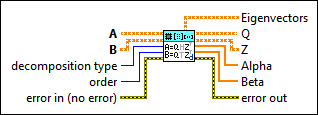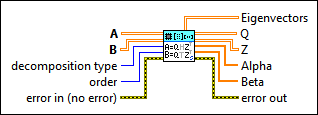QZ Decomposition VI
- Updated2023-02-21
- 10 minute(s) read
QZ Decomposition VI
Owning Palette: Linear Algebra VIs
Requires: Multicore Analysis and Sparse Matrix Toolkit
Computes the QZ decomposition of a pair of matrices A and B.
Wire data to the A and B inputs to determine the polymorphic instance to use or manually select the instance.
QZ Decomposition (DBL)

 |
A specifies the first square matrix. A and B must be the same size. | ||||||||||
 |
B specifies the second square matrix. A and B must be the same size. | ||||||||||
 |
decomposition type specifies the type of decomposition.
|
||||||||||
 |
order specifies how to order the generalized eigenvalues, Alpha and Beta, and the corresponding Eigenvectors, Q, and Z. order is valid only when decomposition type is Generalized Schur.
|
||||||||||
 |
error in describes error conditions that occur before this node runs. This input provides standard error in functionality. | ||||||||||
 |
Eigenvectors returns a complex matrix that contains the generalized eigenvectors in its columns. | ||||||||||
 |
Q returns an orthogonal matrix. Let trans(Q) represent the transpose matrix of Q, then Q satisfies the following conditions:
|
||||||||||
 |
Z returns an orthogonal matrix. Let trans(Q) represent the transpose matrix of Q, then Z satisfies the following conditions:
|
||||||||||
 |
Alpha returns the numerators of the generalized eigenvalues of matrix pair (A, B). If Betai is nonzero, Alphai/Betai is a generalized eigenvalue of (A, B). | ||||||||||
 |
Beta returns the denominators of the generalized eigenvalues of matrix pair (A, B). If Betai is nonzero, Alphai/Betai is a generalized eigenvalue of (A, B). | ||||||||||
 |
error out contains error information. This output provides standard error out functionality. |
QZ Decomposition (SGL)

 |
A specifies the first square matrix. A and B must be the same size. | ||||||||||
 |
B specifies the second square matrix. A and B must be the same size. | ||||||||||
 |
decomposition type specifies the type of decomposition.
|
||||||||||
 |
order specifies how to order the generalized eigenvalues, Alpha and Beta, and the corresponding Eigenvectors, Q, and Z. order is valid only when decomposition type is Generalized Schur.
|
||||||||||
 |
error in describes error conditions that occur before this node runs. This input provides standard error in functionality. | ||||||||||
 |
Eigenvectors returns a complex matrix that contains the generalized eigenvectors in its columns. | ||||||||||
 |
Q returns an orthogonal matrix. Let trans(Q) represent the transpose matrix of Q, then Q satisfies the following conditions:
|
||||||||||
 |
Z returns an orthogonal matrix. Let trans(Q) represent the transpose matrix of Q, then Z satisfies the following conditions:
|
||||||||||
 |
Alpha returns the numerators of the generalized eigenvalues of matrix pair (A, B). If Betai is nonzero, Alphai/Betai is a generalized eigenvalue of (A, B). | ||||||||||
 |
Beta returns the denominators of the generalized eigenvalues of matrix pair (A, B). If Betai is nonzero, Alphai/Betai is a generalized eigenvalue of (A, B). | ||||||||||
 |
error out contains error information. This output provides standard error out functionality. |
QZ Decomposition (CDB)

 |
A specifies the first square matrix. A and B must be the same size. | ||||||||||
 |
B specifies the second square matrix. A and B must be the same size. | ||||||||||
 |
decomposition type specifies the type of decomposition.
|
||||||||||
 |
order specifies how to order the generalized eigenvalues, Alpha and Beta, and the corresponding Eigenvectors, Q, and Z. order is valid only when decomposition type is Generalized Schur.
|
||||||||||
 |
error in describes error conditions that occur before this node runs. This input provides standard error in functionality. | ||||||||||
 |
Eigenvectors returns a complex matrix that contains the generalized eigenvectors in its columns. | ||||||||||
 |
Q returns a unitary matrix. Let trans(Q) represent the conjugate transpose matrix of Q, then Q satisfies the following conditions:
|
||||||||||
 |
Z returns a unitary matrix. Let trans(Q) represent the conjugate transpose matrix of Q, then Z satisfies the following conditions:
|
||||||||||
 |
Alpha returns the numerators of the generalized eigenvalues of matrix pair (A, B). If Betai is nonzero, Alphai/Betai is a generalized eigenvalue of (A, B). | ||||||||||
 |
Beta returns the denominators of the generalized eigenvalues of matrix pair (A, B). If Betai is nonzero, Alphai/Betai is a generalized eigenvalue of (A, B). | ||||||||||
 |
error out contains error information. This output provides standard error out functionality. |
QZ Decomposition (CSG)

 |
A specifies the first square matrix. A and B must be the same size. | ||||||||||
 |
B specifies the second square matrix. A and B must be the same size. | ||||||||||
 |
decomposition type specifies the type of decomposition.
|
||||||||||
 |
order specifies how to order the generalized eigenvalues, Alpha and Beta, and the corresponding Eigenvectors, Q, and Z. order is valid only when decomposition type is Generalized Schur.
|
||||||||||
 |
error in describes error conditions that occur before this node runs. This input provides standard error in functionality. | ||||||||||
 |
Eigenvectors returns a complex matrix that contains the generalized eigenvectors in its columns. | ||||||||||
 |
Q returns a unitary matrix. Let trans(Q) represent the conjugate transpose matrix of Q, then Q satisfies the following conditions:
|
||||||||||
 |
Z returns a unitary matrix. Let trans(Q) represent the conjugate transpose matrix of Q, then Z satisfies the following conditions:
|
||||||||||
 |
Alpha returns the numerators of the generalized eigenvalues of matrix pair (A, B). If Beta is nonzero, Alphai/Betai is a generalized eigenvalue of (A, B). | ||||||||||
 |
Beta returns the denominators of the generalized eigenvalues of matrix pair (A, B). If Betai is nonzero, Alphai/Betai is a generalized eigenvalue of (A, B). | ||||||||||
 |
error out contains error information. This output provides standard error out functionality. |
QZ Decomposition Details
The following table lists the support characteristics of this VI.
| Supported on RT targets | Yes |
| Suitable for bounded execution times on RT | Yes |
Refer to the Details section in the QZ Decomposition VI for more details about this VI.